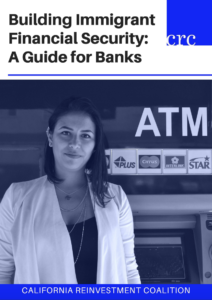 Building Immigrant Financial Security: A Guide for Banks
Building Immigrant Financial Security: A Guide for Banks
California Reinvestment Coalition
First published August 2018
Immigrant communities urgently need access to safe and affordable financial services to prepare for immigration-related emergencies, to protect their assets, and to build their economic futures. As targets of unprecedented federal action and corrosive rhetoric, immigrant families across California report feeling threatened, whether or not they have temporary or permanent authorization to reside and work in the United States.
Immigrants are working and saving to secure a future for themselves and their families, often including children or other family members who were born in the U.S. or otherwise have legal residency or citizenship, comprising “mixed-status” families.
Some immigrant families who qualify for food assistance and other social services, because they are both low-income and have the requisite immigration status, have nonetheless stopped using them because of federal threats that use of these services may be held against them in future immigration proceedings.1 Others are facing sudden changes in immigration law, leading them to spend hundreds if not thousands of dollars on legal fees, and facing the sudden loss of their ability to earn income for their families.
Families facing sudden economic pressures because of changes to the immigration status of someone in their family are more likely to experience financial crises that could destabilize them in the long term.
Banks are uniquely situated to provide critical financial services to low- and medium-income communities and get federal credit for doing so under the Community Reinvestment Act. Unfortunately, many banks have failed to meet the needs of these communities, by offering expensive products, engaging in deceptive business practices, and lacking culturally competent services.
Some banks that have previously offered immigrant-friendly services have recently added invasive questions about citizenship status to their account opening process and sought to confirm the citizenship status of current customers. This dovetails all too neatly with the political agenda of those who would like to see the number of immigrants in the U.S. decimated, and immigrant communities politically marginalized and economically weakened.
CRC has learned of several incidents where bank customers have been asked to provide citizenship information. One couple from Maryland received a letter in the mail from their bank, but didn’t think they needed to respond, after 20 years of being customers, and were eventually called by the bank to confirm the husband’s dual citizenship. A man from Tennessee received a similar letter asking to confirm his citizenship, while another couple in Kansas City had their accounts closed unexpectedly when they did not respond to their bank’s request for information.
Banks can and should repair their relationship with immigrant communities by addressing these issues.
This guide includes recommendations that provide mutual benefit for immigrant communities and financial institutions alike, within the legal requirements banks must comply with.
Download Resource